If you’re looking for an autobiography that weaves together great literature, fascinating medical science, a love story, and one that explores the meaning of life, then this is the book for you: When Breath Becomes Air by Paul Kalanithi. It’s the story of a doctor on the verge of completing ten years of training as a neurosurgeon who is suddenly diagnosed with inoperable lung cancer. At age 36, he goes from being a top-notch doctor treating the dying, to being a vulnerable patient facing his own death.
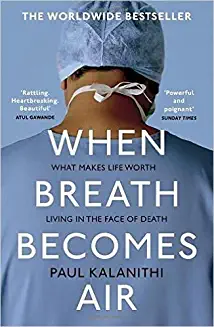
First, a little background. Until the age of ten, Kalanithi lived in New York with his parents and two brothers. When he was about 10, the family moved to Arizona. His father was a cardiologist whose devotion to his work sometimes made him a “passing mirage” at home. His mother, a Hindu, was trained as a physiologist. She insisted that her sons read “great books” and often drew up a reading list for them. Kalanithi credits her with instilling in him his love for literature. Both parents were tremendously supportive of him throughout his life—and especially as he faced his death.
Kalanithi earned degrees in English literature, biology, history, and philosophy, before switching to science and medicine. He studied medicine at Stanford, Cambridge, and Yale eventually deciding to become a neurosurgeon. He chose this field for several reasons. He felt neurosurgery “seemed to present the most challenging and direct confrontation with meaning, identity, and death.” By operating on a person’s brain, neurosurgeons “work in the crucible of identity.” Because the brain “mediates our experience of the world, any neurological problem forces the patient and the family, ideally with a doctor as a guide, to answer the question: What makes life meaningful enough to go on living?”
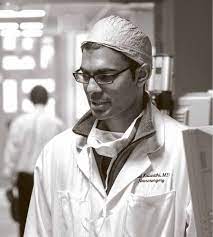
(Photo by Norbert von der Groeben)
While at Yale, Kalanithi meets another medical student, Lucy, who becomes his wife. Though very much in love, their relationship encountered serious trouble at the end of his residency. They weathered that storm together, and, in the epilogue, Lucy writes, “I am glad Paul wrote about it. It’s part of our truth.” The entire epilogue is quite beautiful.
Some aspects of the story that stood out for me are these:
The grueling work of the medical profession–especially neurosurgery. He vividly describes the long hours, the constant striving for perfection, the difficult decisions, the heart wrenching deaths.
His relationship with Emma, his oncologist. At first they are two doctors treating his cancer, their conversations steeped in medical jargon. But then comes the day, close to the end, when he relinquishes his “doctor role” and simply becomes her patient. Emma is such a caring and wise doctor. When a new tumor appears in his brain, she says to him, “This is not the end. Or even the beginning of the end. It is just the end of the beginning.” His reaction to her words: “And I felt better.”
It isn’t until he becomes a patient himself that he realizes what it feels like to be a patient. He regrets that he didn’t have this knowledge earlier in his career.
I found intriguing Kalanithi’s account of his journey from staunch atheism back to the Christian faith he had been raised in as a child. Though he loved science, he found that science was unable “to grasp the most central aspects of human life: hope, fear, love, hate, beauty, envy, honor, weakness, striving, suffering, virtue.” He says, “I returned to the central core values of Christianity—sacrifice, redemption, forgiveness—because I found them so compelling.” In the epilogue, Lucy describes how, a few months after his diagnosis, “we sang the hymn ‘The Servant Song’ while standing side by side in a church pew, and the words vibrated with meaning as we faced uncertainty and pain together: ‘I will share your joy and sorrow / Till we’ve seen this journey through.'”
His and Lucy’s decision to have a child. Little Elizabeth Acadia (Cady) was born eight months before his death. The last paragraph of his story is addressed to her: “… you filled a dying man’s days with sated joy, a joy unknown to me in all my prior years, a joy that does not hunger for more and more but rests, satisfied. In this time, right now, that is an enormous thing.”
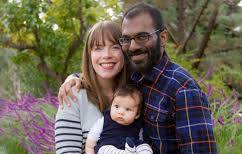
For reflection:
Did anything stand out for you in Dr. Kalanithi’s story?
If you have read the book, what is your opinion of it? Is there anything you would add?
If you have had to face your own mortality in a striking way—or the mortality of a loved one—what helped you during this time?
Lucy describes standing side by side with Paul at Mass, singing “The Servant Song.” It seems appropriate to choose that song for today’s reflection. It was written by Richard Gillard, described as a British New Zealander. It is sung by the “Sunday 7 pm Choir.”
I invite you to add a comment below…



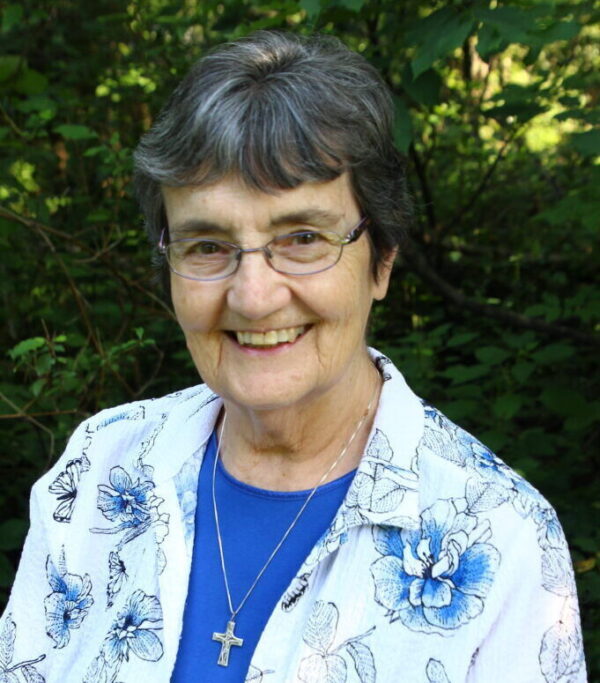

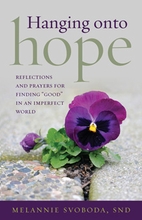

8 Responses
Good morning, Sr. Melannie…I love it when you review books, and I’m sure my local bookstore loves it too! Mind you, I have yet to read a single page of this book, but somehow just your description of it made me tear up. By the way, “The Servant Song” might be my new favorite hymn. “I will be your Christ-light for you/ in the night-time of your fear.” Just beautiful!
Thank you!
Thank you, Sister, for offering yet another meaningful book. I have gratefully added the book to my reading wish list. I find that my experiences of loss through illness and death, while extremely painful and vulnerable, are also those experiences most transformative, in which small glimpses of God’s perspective shine through. Sister, may God bless your ministry! Joanne
Took the words right out of my thoughts!
Thank you once again, Sr. Melannie. I am at a loss for words! This is an incredible story of courage, openness and so much more. I love how his Doctor said upon discovering a new tumor, this is the end of the beginning and how peaceful Dr. Kalanithi felt. The journey he takes all of us through is a gift!
Thank you for your ministry as always!
Nancy
I, too, am at a loss for words. ❤️ that hymn, probably my favorite! Thank you, Sr Melannie for your thought-provoking insights and posts
Dear Sister, Thanks for all you do! Just finishing Braiding Sweetgrass that you recommended a while back. Will look forward to reading”When Breath Becomes Air”. Especially as I have cancer now. Pray and Trust and God is Good! L&P Nancy
I lost my husband in 2005 to glioblastoma, stage 4, the most devastating form of brain tumors. We were blessed with a wonderful neurosurgeon who was so warm and loving to our family yet honest about his chances from day one. He estimated he would have 18 months to live and that was his fate almost to the day. It was just before Holy Week that year, which I found to be very comforting. He was so brave through it all and more concerned about me and what I would do when he was gone. Hard to believe it has been 18 years without his presence but grateful for the 40 years we did share.
Sr. Melannie, I always enjoy your words of wisdom and inspiration. After I read this blog entry, I went online and ordered the book. It is wonderful! Thank you for the recommendation! My stepson is finishing up a Master’s degree in nursing, and I plan to pass this on to him.